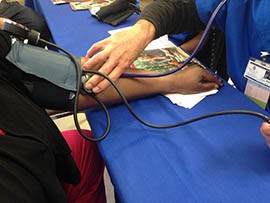- Slug: Go Red, 1st Ld-Writethru,500
- Note: Subs 5th graf to CORRECT that Yap said women tend to ignore symptoms of heart disease as well as stroke and that women are more likely to attribute symptoms of heart disease to fatigue and stress. A corrective reflecting this correction moved Feb. 9.
- Sidebars: Stroke symptoms; about Go Red.
- Photo available below
By MACKENZIE CONCEPCION
Cronkite News
PHOENIX – As medical director for Phoenix Baptist Hospital’s emergency department, Brian Hess sees people every day who’ve suffered strokes. Often, he said, those patients, as well as those around them, had no idea how to identify a stroke.
“If you’re not looking out for possible stroke symptoms, you’re probably going to miss it, and that goes for providers as well as patients,” he said.
With that in mind, the hospital’s staff dedicated Friday to educating people about how to spot stroke symptoms early. Red balloons graced the main lobby for the Go Red event, and nurses gave free blood pressure tests and handed out pamphlets on heart disease.
It was part of National Wear Red Day, sponsored by the American Heart Association, which encourages people don their red clothing to call attention to heart disease.
Alma Yap, a nurse at the hospital, said in her experience, women tend to ignore symptoms of stroke and heart disease more often than men. She said women often attribute heart attack symptoms like shortness of breath and chest pressure to stress.
“They’ll take something for acid reflux or maybe an aspirin, and they won’t even bother to call 911,” Yap said.
According to the American Heart Association, 55,000 more women than men have strokes each year. The study noted that this may be because women have a higher life expectancy than men, and strokes happen more often in the oldest age groups.
Hess said because of this, women should be especially concerned with possible stroke symptoms.
“A lot of people just don’t realize that these symptoms can be signs of something really dangerous,” he said
Arlene Copley, a former cardiac nurse at the hospital and volunteer at the event, said stroke is one of many risks associated with diabetes.
“Heart attack, kidney problems, sight and circulation problems – diabetes is the big cause in many illnesses,” she said.
Copley said the key to controlling diabetes is a healthy lifestyle, mainly diet and exercise.
Hess said this lifestyle can also help people avoid strokes.
“The more we get the word out, the more we raise awareness about controlling diabetes and high blood pressure and recognizing stroke symptoms early, the better off the population will be,” he said.
Joy Dilley, director of stroke coordination at the hospital, said the free tests helped some visitors identify irregularities in their blood pressure and heart rate they’d never noticed.
“The idea is that if we stress some of the risk factors of heart disease, they’ll be more aware of it,” she said. “And with all the people stopping by, I think we’ve done that.”
^___=
Stroke symptoms:
● Sudden numbness in the face, arms or legs, especially on one side of the body.
● Difficulty speaking, slurring words.
● Sudden confusion.
● Dizziness, unsteadiness of the feet.
● Shortness of breath.
● Pressure between abdomen and heart.
● Sudden severe headache.
Source: American Heart Association
National Wear Red Day:
● First Friday of February, which is National Heart Month.
● Brings attention to the fact that heart disease is the No. 1 killer of women.
● Participants wear red and use social media (#GoRed) to call attention to heart disease.
^___=

Phoenix Baptist Hospital offered free blood pressure checks Friday as part of a Go Red event calling attention to the dangers and symptoms of stroke, heart disease and diabetes. (Cronkite News Photo by Mackenzie Concepcion)

Alma Yap, a nurse at Phoenix Baptist Hospital, said in her experience women tend to ignore stroke symptoms more often than men. The hospital held a Go Red event Friday to educate people about the dangers of strokes, heart disease and diabetes. (Cronkite News Photo by Mackenzie Concepcion)